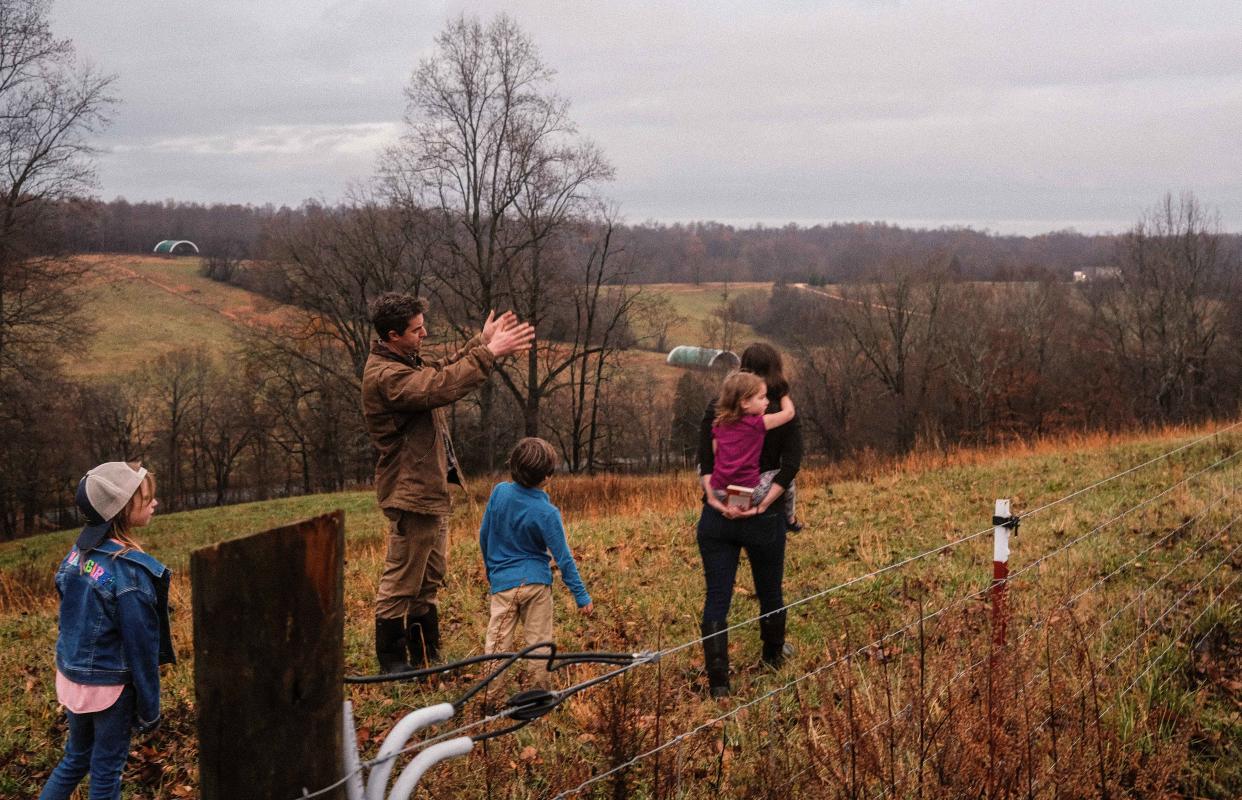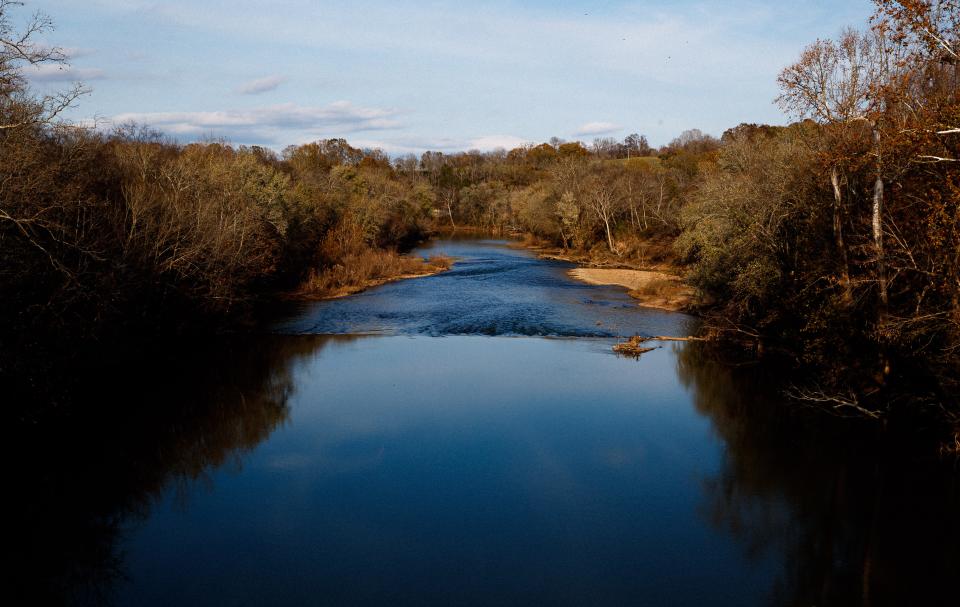Maury Co. farmer, officials battle to protect Duck River as House considers scenic status bill

Maury County native Sam Kennedy, III, farmer and co-owner of Kettle Mills Farm, a 212-year-old family farm run by the Delk and Kennedy families for seven generations, is speaking out in favor of a bill that would expand protections to the Duck River.
Kennedy, along with many others from Maury County, has spent this week reaching out to legislators to convey his concern that the fate of the drinking water and recreational use of the Duck River in the Southern Middle Tennessee region hinges on the approval of House Bill 0447. The water supply from Duck River serves approximately 250,000 people in the region.
The bill that would expand the river's Class II Scenic Waterway status by approximately two miles on the western side, was postponed Wednesday until next week by the House Agriculture and Natural Resources Committee.
If passed, the bill would also thwart a proposed solid waste landfill from being developed nearby.
"The drinking water for the Southern Middle Tennessee region is at risk," Kennedy said. "The ability of my children to swim and play in the Duck River, which runs through my property is at risk, and my livestock's ability to drink the water in the river is at risk."

The river runs through Kennedy's generational farm, where he raises sheep and other livestock for processing. His ancestors once built a mill on the river, which opened up the waterway to business and commerce before World War II.
Kennedy said the river's health is important to the overall health of the entire community and region.
"The health of a community is directly related to its land and the natural resources around it," he said.
Rep. Scott Cepicky, R-Culleoka, sponsor of the bill, conveys the same sentiment, citing the river as the "most biodiverse river in the world," as classified by environmental reports, showing the presence of numerous species of rare fish and aquatic life.

Trinity Business Group opposes bill, promotes landfill
Time ran out last Thursday during the committee's discussion, when long-silent landowner, Sid Brian, co-founder and president of Baton Rouge-based Trinity Business Group spoke before the committee, advocating to expand landfill operations at the former Monsanto Company chemical plant site in Columbia, located over a mile from the Duck River.
Opposing the landfill expansion, Cepicky made a plea to the House committee last week to strengthen the protections of the Duck River to preserve the health of the region's clean drinking water.
More:Bill to protect Duck River passes first state hurdle as landfill proposal looms in Columbia
More:Elected leaders rally to protect Duck River through proposed state bill
“This is a bill that is long overdue for Maury County,” Cepicky said last week during the previous committee meeting.
Cepicky has vowed to fight to preserve the waterway for drinking water and recreational use for future generations.
Meanwhile, Brian, under Trinity Business Group, has filed solid waste landfill permits with the Tennessee Department of Environment and Conservation, including a tire incinerator, on previously defunct land at the former Monsanto site. Brian’s presentation before the House committee sparked a lengthy Q and A last week, ultimately delaying the bill that would block Brian’s company from operating landfills at the site.
The Senate, however, stamped its unanimous approval of companion bill, SB 0464, approving the scenic status expansion of the river.
Cepicky explained to the House committee last week that the bill is a return to strengthen river protections just like he advocated for in 2013 when a property and zoning resolution placed a block on landfills within two miles of a portion of the Duck River.
“I am absolutely impacted by this bill,” Brian said. “And I am the target of this bill.”
While Brian said he would take “some of the blame” for “not getting our side of the story out sooner,” he was dismayed at what he deemed "inaccurate answers" from last week’s House committee hearing.
“We get it, water and the Duck, without a doubt are feel good, warm and fuzzies,” Brian said. “But it’s a hot topic.”
Some committee members took issue with Brian’s comments, implying that he shirked the serious matter of the potential impact of water purity in the Duck River.
“You describe water as warm and fuzzy,” committee member, Rep. Justin Jones, D-Nashville said. “I was just struggling with that analysis of something that is just so basic for our survival. We have residents here from Maury County who are concerned about polllution in their community, who live in that community.”
Landfills developer argues land ownership rights
Three nonoperational landfills currently exist on the site near the Duck River that’s also near the former Monsanto Company site, where past site work caused pollutants to get into the river.
Brian’s aim for Trinity group is to utilize and expand one of the landfills on the 2,000 acres they control on the site.
Doubling down on his company’s intent to operate a 305-acre regional solid waste processing site, call it an eco-park, Brian believes his land ownership rights entitle him to do so in the State of Tennessee.
“Trinity Business Group is primarily filling a need,” Brian said, indicating that his proposed service to the area through the proposed landfill operations is an effort to alleviate soon-approaching top offs to Tennessee landfills by 2030.
Waste officials in the Middle Tennessee region have been grappling with where to process regional trash as landfills fill up, such as Middle Point landfill in Rutherford County, which has faced scrutiny such reaching capacity in the next 10 years and allegations of waterway pollution.
More:'A pending crisis': Rutherford County to ship out trash when Middle Point Landfill closes
More:City claim of landfill polluting river unconfirmed by state: 'No leachate was found'
Brian claimed to employ “extensive research,” in searching for the right spot, saying that “this property checks all the boxes," though it was not entirely clear, nor was it asked which boxes it checked.
2,000 letters: Maury County rallies strong showing to protect river
Cepicky, advocates and Maury County elected officials, including Maury County Mayor Sheila Butt, sent 2,000 letters of support for the bill, presenting concerns about Trinity Business Group's efforts to construct the solid waste landfills.
Cepicky explained that it took 60 years to restore the Duck’s crown status for biodiversity among world rivers and that he doesn't want the river's health to backslide, including the threat of leachate affecting the water through possible runoff from landfills.
“There are people alive right now, who would testify if I could get them here, that there was a time when they would not eat the fish from the Duck River,” Cepicky said. “You would not swim in the Duck River. It was that polluted.”
TDEC initially gave green lights to Trinity under a "permit-by-rule" ordinance, which allows land owners to bypass public input for existing sites.
In two letters from Brian and his attorney Thomas White, Brian argued that he retains property ownership rights for the acreage in question at the former Monsanto site, which should protect his company's efforts to continue landfill work.
He cited that during the months of May, June and July, four permit applications for tire processing were given the permit-by-rule exception by TDEC. White’s letter specifically make brief mention that a potential "lawsuit" could cost the state “tens of millions, if not hundreds” of millions of dollars.
Ahead of the proposed bill last fall, environmental advocates, with Cepicky and Maury County Commission Chairman of the Board Eric Priviti in attendance, held a meeting at the Memorial Building in Columbia to discuss their stance against Trinity's proposed permits to TDEC.
More on preservation:The latest in the battle of over a pristine Tennessee creek? A public records lawsuit.
Calling it a state obligation to enact zoning laws to protect the natural resource, Cepicky made his plea before the committee to help to retain clean, viable and recreational water sourcing for the foreseeable future.
Columbia resident Gale Moore, long-time community advocate for the environmental protection of the Duck River , joined others in email correspondence and updates over the past few months.
“A high powered Nashville law firm hired by an out-of-state industrialist should not out-trump hundreds of Maury County citizens, landowners and those who recreate on our river,” Moore said. “These are the people, who have spent time and effort to let you know that the Duck River is scenic and should be designated so.”
This article originally appeared on The Daily Herald: Maury Co. farmer, officials fight to protect Duck River as House considers bill

